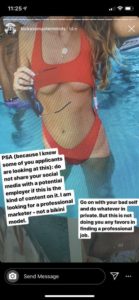Defining “Fit”
For the longest time, recruiters and jobseekers have grappled with defining what “fit” means to themselves or their organizations. I have my own opinions of what the term means (and I’m sure you do too), but that’s not the focus of my post. This post is about how job seekers can increase their chances of being reasonably considered for positions based on merit by controlling their digital narrative.
Digital Narrative?
So, what exactly is your “digital narrative”? I’m glad you asked. Your digital narrative is the information a recruiter can find about you in a cursory Google search or a glance through your social media pages. I’m not speaking about your “professional” social media pages; I’m talking about your “personal” pages – those pages illustrating you are living your best life away from work.
Social Media and Online Privacy
Depending on who you ask, internet-based social media has been around for roughly 30-40 years. Usenet appeared in 1979, while SixDigrees.com came online around 1997 – all of which is within my lifetime. Social media offers virtually anyone the ability to legally peek into your life for free – including employers – and when they do, they form opinions. Those opinions lead to decisions and actions that may impact you professionally. I’m not saying this is right or wrong – I’m saying that it’s a new reality, and like it or not, we’re all dealing with it. Some employers have even started requesting social media passwords, implying a belief that your job application grants them dominion to peruse your private social media pages as a condition of employment. The truth is the role of social media is still evolving and has yet to be clearly defined. Employers have been successfully sued for wrongful termination based on social media posts. Students have sued principals over disciplinary actions enacted after social media posts. These legal precedents are having the effect of defining boundaries for organizational use of social media. “Online privacy” is an oxymoron, in my opinion, but let’s keep it 100 – social media is here to stay. The obvious advice of “Don’t post something if you want it to stay private…” applies, but there’s more to it than that.
Social Media – Being a Digital Nudist
From its inception, users have wrestled with a fundamental decision about social media: “Should I post this or not?” In my opinion, this question presents an issue analogous to being a nudist. Nudists engage in the practice of going naked wherever possible, but their activity tacitly encourages others to do the same. This, of course, leads to the familiar debate about how much nudity in public, art, or entertainment is appropriate. Arguments on both sides touch on everything from religion to governance. The bad news is the debate about what to post is unresolved and will probably continue forever. The good news is that this analogy provides a great illustration of why cultivating your “professional” digital narrative should be a priority – especially during your job search.
Kickass Masterminds Post
 I used the example of nudists because I’m going to provide an example of what I mean. In 2019, a company called “Kickass Masterminds” posted a job opening for a marketing position. Based on a screenshot of their LinkedIn page at the time, the female-owned firm worked with “rebellious business owners” who “yearn for freedom and are ballsy enough to chase after it” and who “want other like-minded people to have their back when shit gets tough…”. An applicant named Emily Clow applied for the job and was asked to submit additional application materials – including “an Instagram and/or Facebook” handle. Ms. Clow accommodated the request. Masterminds also suggested Ms. Clow follow their social media pages, which she did. Soon after, Ms. Clow learned that Masterminds CEO Sara Christensen had posted a photo of Clow in a bikini in a “public service announcement,” stating that the image was inappropriate, unprofessional and that applicants should avoid displaying such content employers. Christensen posted the PSA on Mastermind’s social media. Here’s how it read: “PSA (because I know some of you applicants are looking at this): do not share your social media with a potential employer if this is the kind of content on it. I am looking for a professional marketer — not a bikini model. Go on with your bad self and do whatever in private. But this is not doing you any favors in finding a professional job.”
I used the example of nudists because I’m going to provide an example of what I mean. In 2019, a company called “Kickass Masterminds” posted a job opening for a marketing position. Based on a screenshot of their LinkedIn page at the time, the female-owned firm worked with “rebellious business owners” who “yearn for freedom and are ballsy enough to chase after it” and who “want other like-minded people to have their back when shit gets tough…”. An applicant named Emily Clow applied for the job and was asked to submit additional application materials – including “an Instagram and/or Facebook” handle. Ms. Clow accommodated the request. Masterminds also suggested Ms. Clow follow their social media pages, which she did. Soon after, Ms. Clow learned that Masterminds CEO Sara Christensen had posted a photo of Clow in a bikini in a “public service announcement,” stating that the image was inappropriate, unprofessional and that applicants should avoid displaying such content employers. Christensen posted the PSA on Mastermind’s social media. Here’s how it read: “PSA (because I know some of you applicants are looking at this): do not share your social media with a potential employer if this is the kind of content on it. I am looking for a professional marketer — not a bikini model. Go on with your bad self and do whatever in private. But this is not doing you any favors in finding a professional job.”
Keep Your Eye On the Prize.
Some of you folks reading this post or seeing the video are already considering which side of this debate you’re on, and a good number of you will have excellent points. But let’s stay focused. The goal here is getting a job – not winning a having your job search derailed and thrown into a public debate. It’s awesome that the online community came together and helped Ms. Clow with this problem. Unfortunately, that help is not guaranteed, and I prefer a solid plan to avoid a similar situation.
Stranger Danger and Healthy Digital Boundaries
This new era calls for new standards, but we can also apply some timeless life lessons. Ms. Clow willingly shared her social media at Ms. Christensen’s request. I also think it’s safe to say since Christensen was a potential employer, there was an assumption of professional courtesy and ethics. This whole situation is an excellent example of why trusting strangers is always risky and why
1. we should never trust unfamiliar people or organizations with access to your private social media and
2. One should not assume or trust a stranger will behave ethically – even if they’re a potential employer. Exposure to your private life should be earned and off-limits to those unwilling to work for it – including employers. Anyone seeking access to your private social media pages should be willing to prove why you should trust them or grant access at all. An overactive taste for the salacious is also a great reason to lock down your private pages from snoopers. All of these factors are reasons for a new professional boundary.
Communication is a 2-way street.
Yeah, I know. It’s irritating that great recruiters get a bad wrap because a few folks like Christensen did the wrong thing. We should all be able to be ourselves without being bullied or criticized online. Blocking potential haters from your social media is only half of the task at hand. The other half is being equally diligent in creating content that serves you professionally. Here is where most job seekers miss a fantastic opportunity to control their digital narrative. Even with horror stories everywhere, job seekers still do the bare minimum, not curating their digital narrative and communicating their professional value. I’m here to tell you that communication is a two-way street – even in the screening process. It may not seem as convenient or fun to create professional content, but imagine what might have happened if Ms. Clow had an Instagram and Facebook page dedicated to her work and shared that URL or a link to a job-related video interview instead of her personal page? Imagine if she’d created a 2-3 minute video answering the question “Tell me about yourself” and describing what she could bring to any role. Or maybe some publicly verifiable examples or links of her previous work on social media. She would have satisfied the request for social media links while implying that Mastermind’s interaction would be about her work – not her private life. Boundaries. Some folks may say, “That’s what LinkedIn is for…”. True, but that’s not where 70% of employers spend most of their time creeping around. They want a better idea of “what they’re getting” (aka “fit”), and it’s illegal for them to ask many of the things they’re snooping for. If you’re putting it out there for free, why shouldn’t they have a look into your life away from work? It’s up to you to say, “No, you don’t know me like that…” by locking down your private life and steering them towards excellent job-related material for their consideration. In short, If they’re going snooping around, make sure they find every good thing about how you take care of business on the job – nothing else. Let them find you on Facebook but instead of your private life, serve them up a few testimonials of your previous coworkers or clients bragging about you. Let them see you on Instagram but instead of your love life, spouse, or last weekend, serve them up an excellent presentation on your approach to being a team player. If they need to know more, they can interview you in person.
Connexion Pointe® can help!
You could also provide a single Connexion Pointe® URL when they request a social media handle or link. With Pointe Profile®, you can offer an excellent job-related video interview, testimonials, and just about anything else you can dream of describing on a 2-3 minute video. There’s a free ebook available to show you how to get started and an inexpensive masterclass you can finish in less time than it took to force Christensen to take down her post. Controlling your digital narrative, setting healthy online boundaries are your ticket to boundless success!
In 2023 Control Your Career. Don't Let Your Career Control You!
If you'd like a bird's-eye-view of an excellent, modern job search plan that includes leveraging video, we have a free ebook available to get you up to speed! Just fill out the form below, and we'll send it to you.
© WatchMe Profile Media Group | LLC All Rights Reserved

